
By Neema Mungai, Staff Reporter
House Democrats on the Committee on Education and Labor unveiled their plan to reauthorize the nation’s main federal law governing higher education on Oct. 15. The College Affordability Act (CAA) — a 1,165-page bill with an estimated cost of $400 billion over 10 years — aims to lower the cost of college, improve the quality of higher education, and expand opportunities for students from all backgrounds.
“We can no longer afford to do nothing when 44 million Americans are saddled with $1.5 trillion in debt,” House Speaker Nancy Pelosi told reporters during the bill’s press briefing.
The CAA takes many steps toward lowering the cost of college. The plan implements a federal-state partnership that would make federal funding available to states that make community colleges free and commit to investing in their public colleges and universities.
The bill also aims to increase the value of Pell Grants to cover a larger sum of tuition and the fees associated with attending college, such as food and housing.
For those with student loan debt, the CAA provides some relief by offering access to more generous repayment plans. Existing borrowers would be given the option to switch into new repayment plans that would lower their monthly and total payments by allowing them to refinance their debt at today’s interest rate.
In an effort to improve the quality of higher education, the plan enforces higher accountability and ruling on proprietary institutions, or for-profit schools. This is done through amending the 90-10 rule, which requires proprietary institutions to find at least 10 percent of their revenue from non-federal funding.
Currently, the 90-10 rule excludes veterans’ and servicemembers’ education benefits through the G.I. Bill, leading for-profit colleges to aggressively recruit members of the military. The CAA would restore the threshold to 85-15, as opposed to 90-10, and close the G.I. loophole by no longer allowing any federal dollars to serve as an exception.
House Democrats have often spoken of the importance of expanding opportunities for students from all backgrounds. One way this plan works to achieve this expansion is by increasing mandatory funding for minority-serving institutions such as Historically Black Colleges and Universities (HBCUs) and Tribal Colleges and Universities (TCUs). This would be done by reducing the amount institutions must match in non-federal funding from 100 to 50 percent.
The CAA would also repeal the ban on Pell Grants for incarcerated individuals, allowing them to receive an education and have a better chance at success once they reenter their communities.
Chairman Bobby Scott (D-VA), the bill’s sponsor, and Rep. Jahana Hayes (D-CT) held a student media call to discuss the importance of the legislation on Oct. 28.
The media call was an opportunity for the Chairman and the committee to engage student reporters on CAA ahead of its markup.
During the call, Neema Mungai, who is a staff writer for The Hilltop, asked the representatives how the bill would amend work-study programs to better prepare students for jobs in their field of study.
“One of the changes we make in work-study is we encourage the work to be more aligned with [students’] field of study. Most of the jobs now are really just offsetting jobs that the colleges are already obligated to fulfill, such as jobs at the library,” responded Chairman Scott.
The following day, on Oct. 29, the Education and Labor Committee began its three-day markup in which over 40 proposed amendments were introduced, debated, and voted on. Rep. Susan Davis (D-CA) offered a substitute amendment that would replace the current bill and increase the maximum Pell Grant award even further by $625, the highest since the program was enacted.
Although the legislation was not introduced through bipartisanship, multiple amendments from both sides of the aisle were passed unanimously. This does not include a 685-page substitute amendment offered by Ranking Member Virginia Foxx (R-NC). Republicans argued that the bill would be throwing money at a failing education system instead of investing directly in students and their families.
“The Democrats use American taxpayer money to give illegal immigrants tuition-free community college and Pell Grants, which are funds that should be directed towards low-income students to help pay for college,” said Ranking Member Foxx during her opening statement.
Despite Republican efforts, the legislation advanced out of committee on a party-line vote (28-22) with unanimous Democratic support.

